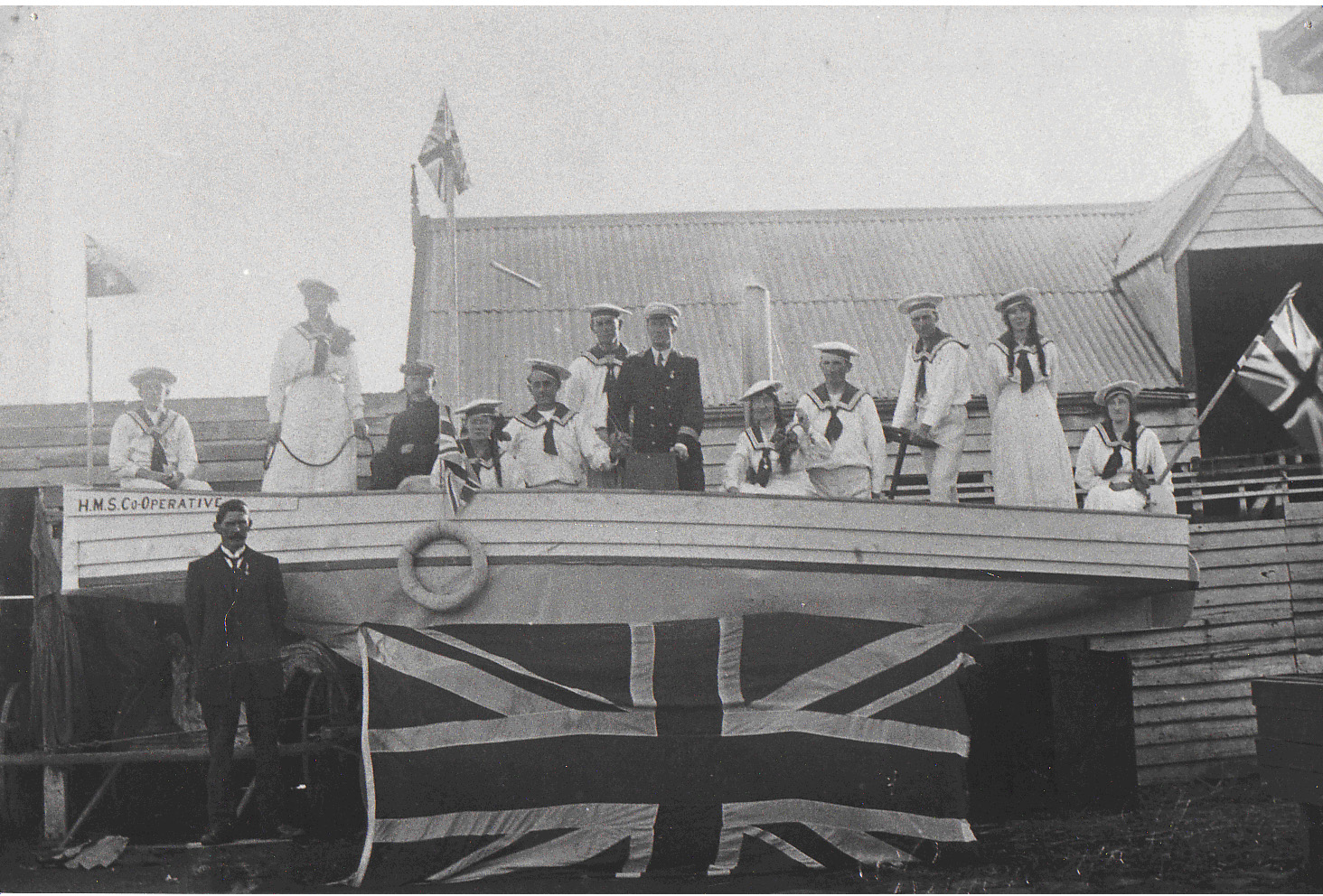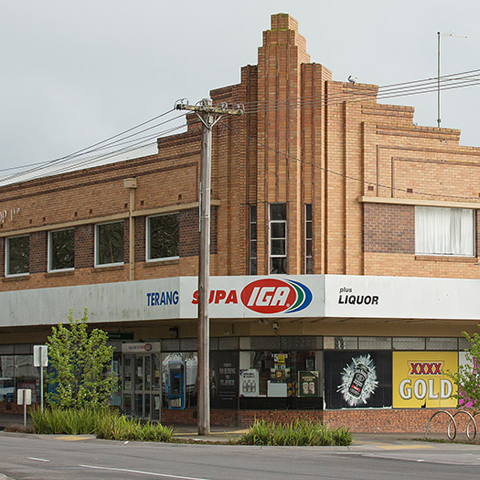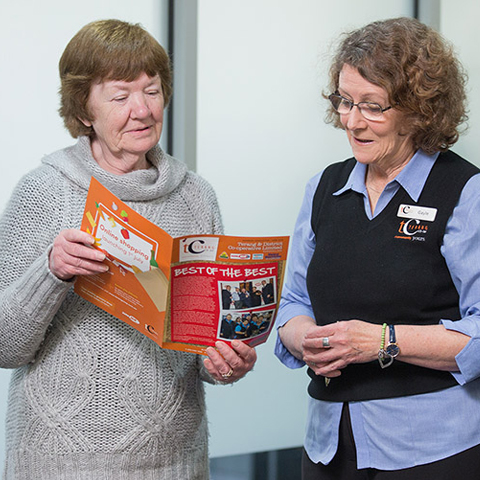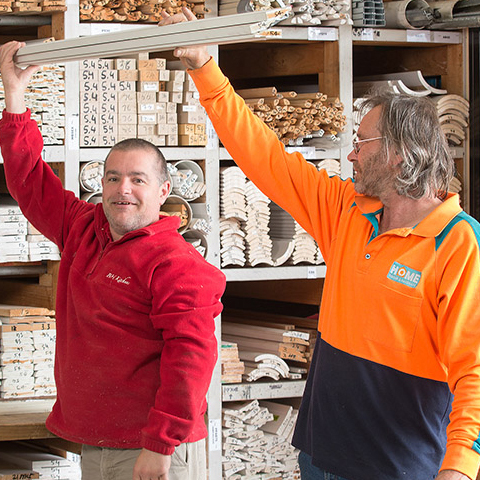The Terang & District Co-operative was established in 1908 and is fondly known by the locals as the ‘Co-op’.
Martin Brennan was the local entrepreneur that decided local farming families needed their own Co-operative. Born in 1868, Brennan was the son of a successful dairy, fat lamb and cattle farmer and had the business nous to bring such a vision to fruition.
He was the chairman of the butter factory at Glenormiston and the director of numerous companies in Melbourne. He was later Vice Chairman of the Western District Co-operative, which was a distribution company for all the dairy products in the region.
Brennan secured Terang’s first grocery and produce store (which had multiple owners since 1858) on the corner of High and Estcourt streets, where the Supa IGA and headquarters are now situated. He was the first Co-op chair and served in this role until his death in 1948.
Over the decades the Co-op has always been at the core of community celebrations, with many residents remembering its popular Australia Day float, Santa appearances, fashion parades, New Year’s Eve balls and annual picnic with lots of ice-cream, fizzy drinks, singing and old-fashioned games.
Through drought, fire, war and the Great Depression, the people behind the Co-op never gave up in the face of adversity. Today, it remains the strongest employer in the district and the soul and backbone of the community.
Historic Snapshot
1908 – 1920
- The Terang & District Co-Operative was formed.
- Directors started selling shares across the district (200 shares for ‘4 bob’).
- The business set up a shop in Noorat (until the late 1960s).
- A monthly magazine called the Western Star was launched.
1920s
- Departments included dressmaking, shoe sales and repairs, millinery, wine and spirits, tailoring, furniture, groceries, men’s mercery and electrical. The ‘fancy department’ sold writing paper, crockery and giftware.
- Farm supplies and timber were at the back of the building
- A messenger would visit local farms collecting customer orders for next-day delivery.
- A ‘cash tram’ along the shop’s ceiling would sent cash from the different departments to the main office for processing.
- In 1926 the first delivery van was purchased.
- In 1928 a garage was built to service cars.
- There were 75 employees.
1930s
- The business struggled through the depression and war (the annual Ball ceased during the war).
- In 1935 Dick Lewis was the first staff member to ride his bike around the district taking orders, covering a 25 mile radius.
1940s
- In 1944 the Co-op was burned to the ground. All records and memorabilia were lost.
- A temporary shop was set up in the band hall until the new building opened in late 1945.
- Staff received a bonus for their contribution after the fire.
- 75 employees were employed after World War II.
- Customers used coupon books up until the mid-1950s.
- The Co-op arranged the first Santa visit to the Terang Hospital.
1950s
- The business experienced much growth.
- Self-service was introduced in 1957.
- A modern cash register system was introduced.
- Director John F Long resigned after 35 years.
- A curtains and window furnishings department was added.
- An active depot operated from the railway station handling grain, oats and briquettes and other produce.
1960s
- The building and produce shed were replaced.
- The store underwent major renovations to improve the presentation of showrooms and service facilities.
- Fresh fruit, vegetables and pre-packaged meat became available.
- The garage closed due to poor sales.
- The business experienced a drop in sales due to the drought (1967-69)
- General Manager Fred Beanham retired after 30 years. He was replaced by Harry Brumm whose legacy included a furniture catalogue, new stock
- selection, wine & spirits and improved parking.
1970s
- Despite a record turnover, profit decreased due to increased overheads, a significant rise in wages and strong competition.
- A hire purchase finance option was introduced for furniture.
- Prefabricated garages, typewriters and a photocopying service were added.
- There were two robberies in 1972.
- The Co-op’s Noorat store closed due to continual losses.
- GM Harry Brumm retired after 40 years and was replaced by Bill Salt.
1980s
- Sales exceeded a record $3 million with a record rebate going back to shareholders.
- Trade fluctuated due to a national price war on groceries, the drought, recession, Ash Wednesday fires, trade competition, increased wages and the rising level of freight costs.
- There were 33 full time employees compared to 70 in the 1970s.
- Departments refocused their offerings to be more relevant to the consumer.
- Shares were sold at $2 each as part of a member recruitment campaign
- Saturday morning trading was introduced.
- Communication, technology and security was updated/installed
- Repairs were made throughout the supermarket, timber yard and hardware department.
- GM Bill Salt retired and was replaced by Ron Mills.
- In 1986 the Co-op returned to posting a profit.
1990s
- After a rollercoaster decade, the 1990s brought more stability, yet all businesses went under review to trim costs.
- Full-time staff were retained to maintain customer service levels, but the $22 week pay rise meant a reduction in rostered part-time staff.
- Sunday trading and Easter Saturday trading started.
- Major store upgrades included general store equipment, computers, register scanning and EFTPOS, power and security.
- In 1993 the business became associated with HOME Hardware (was 1995 Store of the Year by Selleys).
- In 1994 the supermarket was named Supermarket of the Month by Foodtown (shortly after, it changed to Festival).
- Produce and timber departments and supermarket all received major improvements.
- ‘Society’ was dropped from the name and replaced with ‘Ltd’.
2000s
- In 2000, the Co-op reported a $201k profit following a $28k loss the year before.
- In 2002 sales exceeded $8m for the first time.
- There was a $720k supermarket refurbishment.
- The new hardware/timber store and new farm supplies (CRT) store opened.
- The Co-op won an Econavan after recorded the biggest increase in sales for the state of Weston biscuits.
- The discounted fuel offer started.
- At the end of 2007 the Co-op recorded a profit of $303k, increasing sales to a record $15m.
- By the mid-decade, the Co-op was injecting nearly $1.5m per year in wages and had 98 employees.
- Membership sat at 1400 and the Loyalty Program was introduced.
- Current Supermarket computer system was installed
- New Hardware Store opened in March 2002
- Sales exceed $8M for the first time in 2002
- Supermarket refurbishment at a cost of $720,000 in 2003
- New Rural Store opened in March 2006
- Administration Redevelopment at a cost of $200,000 in 2009
2010s
- Further Supermarket extension and improvements in 2010 & 2015.
- Dairy Services re-located to Peterborough Road and took over Wallace Plumbtec, expanding service range to include hydraulics and sheet metal fabrication in 2014
- Camperdown Hardware store re-opened under Co-op ownership in 2014
- Staff numbers exceed 120 for the first time, 2014
- Sales exceed $20 million for the first time in 2014
- Online shopping introduced in the Supa IGA, 2016
- Long-time serving CEO Charlie Duynhoven retires and Kevin Ford appointed as CEO, March 2017
- Dairy Services division re-branded to 360 Dairy Solutions October 2017








